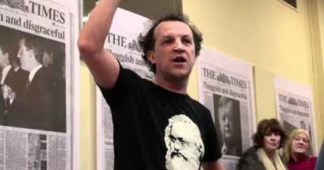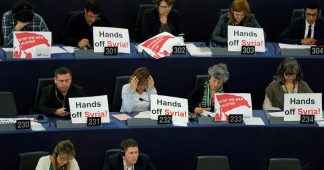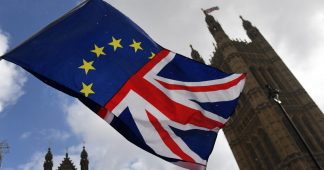Polls predict an earthquake result in today’s Irish election, as Sinn Féin threatens to beat the mainstream parties for the first time. It could bring a united Ireland closer — but it’s also a vote to stop the soaring cost of living.
By Dawn Foster
02.08.2020
Throughout the campaign, both Fine Gael and Fianna Fáil have acted as though this is a normal, business-as-usual election: since 1932 both parties have been used to passing power back and forth between the two, completely convinced that the number of votes for their parties will ensure nothing changes, apart from the delicate balance of power between the pair. But the polls now suggest otherwise. Fine Gael has been seeing considerable drops in its support while Sinn Féin has increased its support each time. In the most recent polls, Sinn Féin has been leading Fianna Fáil in the popular vote, with Fine Gael trailing in third place.
Sinn Féin won’t win a majority, however: the party expected a defensive election and was focused on holding onto its current seats after some bruising results in the European elections. Fianna Fáil has repeatedly said it won’t go into government with Sinn Féin, issuing a far harder and more open rejection than usual, all the while claiming to be Ireland’s original Republican party, despite not running candidates in the north at all. Leader Micheál Martin has been particularly histrionic in this election: previously, Sinn Féin’s opponents pointed to Gerry Adams as purported proof the party and the Irish Republican Army were one and the same; now with the retirement of Adams this election, and the fact Mary Lou McDonald belongs to a younger generation of politicians, the party’s opponents must rely on contemptuous rhetoric and smears of Sinn Féin.
The polls back up what activists from many different parties have said they have seen during canvassing: one Sinn Féin staffer told me: “We’ve been getting the same story on the doors — people who would usually vote for Fianna Fáil or Labour are coming over to Sinn Féin.” Another activist for a Solidarity–People Before Profit alliance candidate said many stated they were giving Sinn Féin their first preference vote, but promised lower preferences for other left candidates.
The rise of Sinn Féin and the fall of Fine Gael has shaken up the race. Taoiseach Leo Varadkar clearly thought Fine Gael were in a position to boost their seat numbers, despite suffering a humiliating defeat in late November, when a by-election in Dublin Mid-West caused by the resignation of former Tánaiste Frances Fitzgerald was won by Sinn Féin’s Mark Ward.
The upending of all previous expectations has also led to the state broadcaster, RTÉ, having to make a U-turn on its initial decision to exclude Sinn Féin leader Mary Lou McDonald from their leaders’ debate. The intense belief that all power rests purely with Fine Gael and Fianna Fáil is shown in the fact the debate was to be exclusively between Leo Varadkar and Fianna Fáil’s Micheál Martin. Sinn Féin complained vociferously but were ignored — until the polls showing a Sinn Féin lead clearly panicked a few executives. Where was the rationale in excluding Sinn Féin, who were neck and neck with Fianna Fáil, but then including Fine Gael, who were polling three points below both? RTÉ announced that their election steering group had met to discuss the debate, and McDonald would now be welcome to participate. Having such limited debates would be seen as an archaism in the UK, despite the first-past-the-post system meaning clear majorities are much more likely: holding debates like these in Ireland in the future is increasingly unviable, especially as the environment climbs the list of voter concerns, and the Greens ask why they are excluded.
The biggest misstep from Fine Gael is assuming two things: that Ireland’s international standing and change on social issues would translate to votes for the party. Varadkar assumed that since the UK had a “Brexit election,” he would receive a boost in the popular vote on account of appearing to come across as the adult in the room during talks on Brexit, Europe, Ireland, and the UK. After the abortion vote, too, many in Fine Gael assumed they could pick up votes among younger voters who had traditionally spurned the party, by acting as though the referendum outcome was brought about by the party, rather than having come about in spite of it.
Instead, both Fine Gael and Fianna Fáil struggled on domestic issues: the homelessness crisis was not properly addressed by either, and a winter election draws attention to how many people are sleeping rough. Attacking other parties for promising to build homes as “unrealistic” when you’ve failed to do so simply doesn’t cut it. Similarly, the specter of the economy haunts Fine Gael: constantly posing for photos with the heads of large corporations enticed by tax breaks is an addiction the party can’t kick, and hurts during elections. Arguing other parties from the soft left onward are economically naive, while claiming austerity was a necessity, is an attempt at political gymnastics they simply could not pull off. Similarly, Fianna Fáil remain haunted by the Celtic Tiger’s implosion, and a whole generation politically formed after the global financial crash, no longer in any mood to accept a limited economic consensus that has never helped even the middle classes particularly in the past few decades.
What happens next most likely remains a grand Fine Gael–Fianna Fáil coalition, though bruised by the results. The latter have stated they will never go into coalition with Sinn Féin, a bold statement that presumed McDonald’s party would achieve far fewer votes and that the surge they have seen in this election is a fluke rather than a rejection of the FG-FF consensus. Much depends on how many voters abandon Fine Gael and Fianna Fáil and where they move to. This may help smaller parties, too, scooping up preferences from people simply fed up with Fianna Fáil and Fine Gael playing trading off power. But both parties should be terrified of losing the majorities they hold currently, and what that will mean for the power-sharing talks that will take place after the votes are finally tallied after many rounds.
The last few days of campaigning have been desperate: many of Varadkar’s campaign tactics were lifted from Boris Johnson and the Conservatives’ playbook from late last year, including one very obvious gimmick in which Varadkar posted a tweet answering selected questions the day after Johnson had posted a near-identical gimmick, even down to the aesthetics. Even missteps, such as getting his staff to pour his coffee from disposable cups into reusable mugs for photo opportunities, show they were aping Conservative strategy. Martin was apparently advised to tone down the anti–Sinn Féin rhetoric, especially since many of the attacks were decried as hypocritical and self-defeating.
Two less remarked upon aspects of this election: if Sinn Féin do get as many votes and seats as the polls predict, they will have the greatest number of votes across the whole island of Ireland. When (not if) a border referendum is held, if people vote for reunification, there is a strong chance Sinn Féin could easily be the biggest party in an all-Ireland election. That should terrify Varadkar and Martin even more.
Even more positive: the heightened drama of the poll has caused the recent uptick in extremism, most notably two ardent racists and conspiracy theorists John Waters and Gemma O’Doherty, to find little audience during the election. The rise in support for left parties and drop for centrists and the Right has meant far more media attention has been paid to the official parties, but it also highlights that the far right are entirely reliant on the mainstream media, that they are creatures of the “traditional” media. Repeatedly we’re told the media merely follow the news and don’t make it. This clearly shows otherwise.
After voting ends on Saturday at 10 PM, the long count begins, and then will come long talks on power-sharing. But so far, polling and work on the doorstep suggest people are deeply fed up with a near-ninety-year cozy political consensus and are happy to cause some real upset and mischief with their ballots.
Published at https://www.jacobinmag.com/2020/02/ireland-elections-sinn-fein-fianna-fail-fine-gael-leo-varadkar











